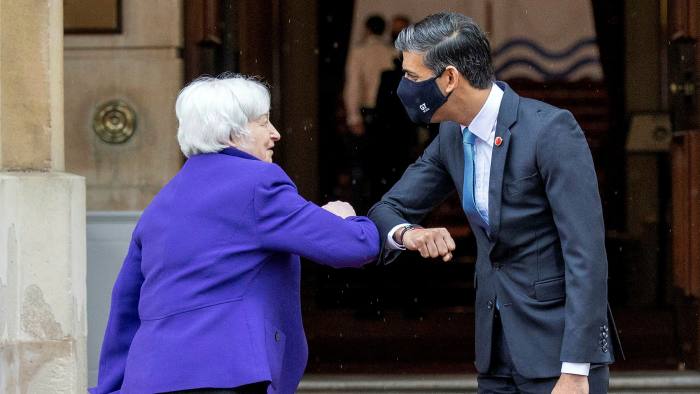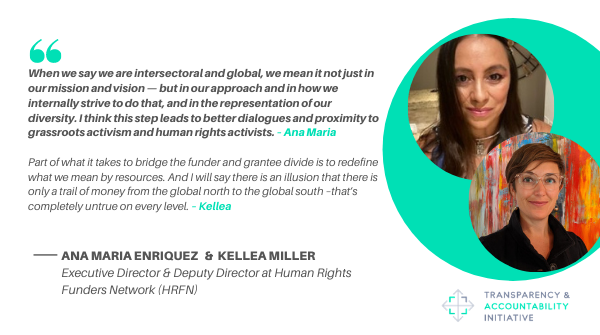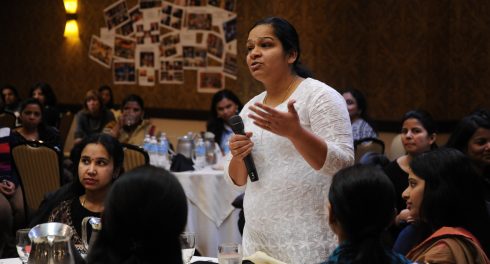Highlights
- Stop the chatter
- Clean signals
- Deal done
- Bullsh$t Gas Detection
- Eastern promise?
- Follow the funds
- TAI Spotlight: It’s time to face up to a worsening pandemic debt crisis
Stop the chatter

Photo Credit: Sebastien Thibault via The Economist
Governments continue to flex muscles against data, news, and actions they don’t like. Nigeria’s government suspends twitter after the social platform freezes the president’s account regarding a post on the 1967 civil war. Kolawole Oluwadare says deletion of President Buhari’s tweets should never be used as a pretext to suppress the civic space and undermine Nigerians’ fundamental human rights.
India’s government also introduces new rules for social media and warns Twitter of “unintended consequences” if not followed. This builds on the Modi government’s twisted relationship with pandemic data. Amy Kazmin explains how rather than be truly transparent, the government “decides what the dominant narrative should be; they try to find data that would support it, and they try to suppress data that would counter it.”
Of course, governments can also disrupt narratives outside their borders. A new series of reports from the RAND Institute show how state-controlled media in Russia and China nations targeted U.S. audiences with malign and subversive information, while a Radio Free Europe/Radio Liberty RFE/RL investigation finds a Russian network is behind a French and German social media campaign aimed at maligning western COVID vaccines. How did they find out? In part thanks to information in the UK’s public beneficial ownership register.
Clean signals
Perhaps we’ll get more stories of beneficial ownership data in action as the United Arab Emirates demands ownership disclosure by next month as part of an anti-money laundering crackdown. More concerning is the revelation uncovered by AccessInfo that the EU might backtrack on fully opening company registers for all because of revenue concerns of Germany, Italy, and the Netherlands, who currently charge for data access.
Implementing a beneficial ownership register is one priority of the Biden Administration who this past week issued a memo declaring corruption a national security threat. According to President Biden, “Fighting corruption is not just good governance. It is self-defense. It is patriotism, and it’s essential to the preservation of our democracy and our future.” A further sign of Washington’s renewed attention on corruption, came with launch of a new Anti-Kleptocracy Caucus in U.S. Congress.
Michelle Gavin reports that South African President Cyril Ramaphosa is having a difficult time re-establishing public trust after his recent appearances in court over previous government corruption. Meanwhile, a fired investigator from Indonesia’s renowned KPK anti-corruption agency, Novel Baswedan, worries about the controversial state apparatus test and how it may signal imminent doom for corruption eradication efforts.
More encouragingly, life is about to get harder in Ukraine if you have a significant influence on mass media, are ultimate beneficial owner of the monopoly, and have confirmed the price of assets that exceeds a million of the minimum wage. That’s right, a new “de-oligarchization” bill was introduced this past week by President Zelensky. It will require exhaustive asset declarations and a ban in taking in part in privatizations of large state-owned enterprises.
For a sense of debates during last week’s UN General Assembly Special Session on anti-corruption check out the threads for #UNGASS2021.
Deal done

Britain’s chancellor Rishi Sunak and US Treasury secretary Janet Yellen at the G7 finance ministers’ meeting in London. Photo Credit: POOL/AFP via Getty Images / Financial Times
Perhaps it was the pleasure of being together in person in London, but the biggest economies finally got behind a global tax deal at the G7 meeting, although the likes of Alex Cobham rightly caution that the potential of a global minimum corporate tax rate will only be fulfilled if it delivers for poorer nations too. Ramifications are already being worked through. For example, The Economist suggests we might be entering the twilight of the tax haven (the end can’t come soon enough).
Leigh Thomas lays out what next to make the deal reality and you can catch up on all the latest via Tax Justice Network’s live blog.
In a big week in the tax world, the European Union (EU) also reached a deal on how multinational companies will have to disclose taxes paid both inside the EU and in countries that Brussels deems to be tax havens. However, data on taxes paid to all other countries can be aggregated leading Chiara Putaturo to criticize a deal she claims leaves the Union “lagging behind” in terms of concrete tax reforms.
What of disaggregated tax impacts? The multilateral institutions behind the Platform for Collaboration on Tax lay out how tax reform can promote gender equality post-COVID, while the Tax & Gender Working Group of Global Alliance for Tax Justice provides guidance and recommendations for a feminist taxation framework.
May 31st was World Tobacco Day and Matt Gallien unpacks the complex relationship between smuggling and taxation in West Africa, arguing that smuggling should not deter governments from increasing taxes on tobacco products.
Bullsh$t gas detection

Last week we featured stories on the prospects for fossil fuel dependent economies. This week, Mark Robinson and Juan Luis Dammert joined other leaders at a United Nations roundtable and reflected on how countries can maximize the benefits of resources for their citizens to plan for the energy transition and how to manage risks of a possible “race to the bottom” amid the post-pandemic recovery.
One group who have already profited handsomely during the pandemic are commodity traders. Javier Blas and Jack Farchy argue it is time to drag traders out of the shadows and pass new laws “to empower regulators to look not only at financial markets but also at the trade-in physical commodities.”
How to assure that data – whether on trading, environmental impacts or jobs – serves citizens? Natural Resource Governance Institute and Publish What You Pay publish case studies in Eurasia on how to move from data to impact. Unsurprisingly, just publishing the data doesn’t achieve accountability.
Global Witness launches the EU Gas Detector that automatically tweets when it detects a meeting being setup between an official and a lobbyist – drawing attention to the cozy links between politicians and polluters. Another promising disclosure avenue is reinforced as the U.N. Climate Change partnered with the Coalition on Materials Emissions Transparency (COMET) to support the development of a harmonized carbon accounting framework to help decarbonize supply chains.
Last year, Ellen Dorsey called on philanthropy to declare a climate crisis. Leslie Anne Johnston now highlights the importance of the International Funders Commitment on Climate Change and urges funders to intensify efforts to fight climate change. Nigel Topping, High-Level Climate Action Champion for the UK, urges philanthropy to not just scale commitments but be open on where investments go. ‘Every foundation concerned about climate change should be completely transparent about its portfolio.’
Eastern promise?
In China, firms are encouraged to voluntarily disclose measures employed to reduce carbon emissions. These are part of revised standards for corporate information disclosure that include required disclosure of any administrative penalties exacted during the reporting period due to environmental problems.
What do we know (and don’t know) about Chinese lending in Africa? Zainab Usman digs into recent data on Chinese loans and finds surprising decreases in the volume of Chinese loans to the continent – raising interesting questions on transparency, access, and voice in Africa-China relations. Although the report presents important context when evaluating Africa’s debt situation, Zainab notes that much of the analysis on Chinese lending in Africa is generated by scholars in European and North American research institutes but African scholarship is needed to contextualize this global debate with lived experiences.
Not that it is just Chinese lenders and corporates increasing their footprint globally – nonprofits are also starting to operate more comprehensively outside of China. Ying Wang discusses the many challenges Chinese NGOs face in working internationally.
Follow the funds
Sonia Kowal urge funders to think critically and be realistic about what impact investing can achieve. Pair with the Adasina Social Justice Index, which informs investors about opportunities in four areas: racial justice, gender justice, economic justice, and climate justice.
Turning to overseas aid, U.K. Foreign Secretary Dominic Raab defend cuts in the aid budget as LSE academics criticize the “lack of transparency” around the cuts – a departure from historically high UK standards of transparency and accessibility of its bilateral funding. For health funding at least, they fear that cuts create a dangerous vacuum into which ‘philanthrocapitalists’ and private foundations will step. Ranil Dissanayake takes a deep dive comparison into the cuts and what it all really means; suggesting that aid spending could be more focused than ever with FCDO pivoting to global public goods rather the usual economic development programs.
Other stories
- How to become activists in the tech-driven, globalized 21st century
- How artificial intelligence impacts marginalized Groups
- OGP give a rundown of their recent Open Gov Week, focusing on Open Renewal
- #UNGASS2021: Why procurement matters and what should be done about it
- Tax Justice Network joins the Addis Tax Initiative
TPA Full Disclosure: Human Rights Funders Network heads on embedding values at the core of grantmaking

What should you do when you find a great partner to work with? “Work with that partner again,” says Ana Maria Enríquez, the Executive Director of Human Rights Funders Network of her Deputy, Kellea Miller. We sat with Ana Maria and Kellea to discuss HRFN’s open philanthropic concept and how the network is putting value at the core of grantmaking.
TAI Spotlight: It’s time to face up to a worsening pandemic debt crisis
It’s time to face up to a worsening pandemic debt crisis | Open Society Foundations
In a conversation with Open Society’s Vanessa Jimenez, Patricia Miranda of Latin American Network for Social and Economic Justice urges policymakers to act now to ensure that the future fiscal burdens does not sabotage the global economy’s effort to recover from COVID-19. Also, don’t miss their new report on harm reduction.
Meet the newest member of the Global Development and Population Program | Hewlett Foundation
Hewlett Foundation welcomes Ousseynou Ngom and Jennifer Obado Joel as the newest member of their Global Development and Population Program (and in turn the TAI funder community)! Jennifer and Ousseynou will continue to work virtually, but will join the foundation in person after office re-opens.
Tackling fraud in U.K. aid | UK FCDO
The Foreign Commonwealth and Development Office responded to the Independent Commission for Aid Impact recommendations on tackling fraud in U.K. aid.
Job Listings
- Consultancy – evaluation and student material development at Integrity Action – June 13, 2021
- Job postings at Hewlett Foundation – Ongoing
- Job postings at MacArthur Foundation – Ongoing
- Job postings at Open Society Foundations – Ongoing
- Job postings at Luminate – Ongoing
Job postings at Ford Foundation– Ongoing - Job postings at FCDO – Ongoing
Calls/Opportunities
- West Africa Civil Society Institute (WACSI) call for papers and articles – Open year-round
- USAID’s Development Innovation Ventures (DIV) grant funding– Ongoing
- Call for research proposals tax and civil society – No Deadline
- Free digital security training– Ongoing
- Call for proposals: Informality, tax, and the state– Proposals accepted on a rolling basis
Calendar
- Lie machines: How disinformation threatens democracy and how to save it –June 10, 2020 (11:00 am – 12:00 pm)
- Compensation Under Investment Treaties: A Pareto-Improving Proposal – June 10, 2021 (8am – 9am E.T.)
- Sand mafias: Environmental harm, corruption, and economic impacts – June 14, 2021
- Time for a Climate Revolution – June 16-17, 2021 (5pm BST / 12pm EST / 9am PST)
- Global Investigative Journalism conference – November 3-5, 2021
- National Tax Association conference – November 18-20, 2021


